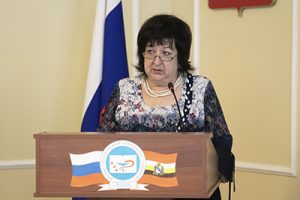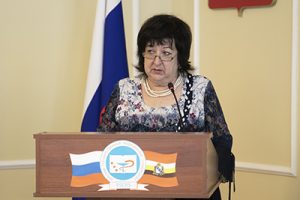
On May 21, 2024 the Department of Philosophy of Kursk State Medical University, Museum of History of KSMU, Kursk Regional Society of Local Lore within the framework of the Year of Family, established by the decree of the President of the Russian Federation hold the Regional Scientific and Practical Conference “German-Fascist occupation of Soviet territories: problems of study, lessons, preliminary results”.
As the President of Russia V.V. Putin: “Genocide by the Nazis against the Soviet people is a crime that has no statute of limitations”. A.A. Netyaga, dean of the medical and pediatric faculties, Candidate of Medical Sciences A.A. Netyaga addressed the audience with a welcoming speech and pointed out: “History is cyclical, unfortunately, and one that should not be repeated, so the theme of the conference is very timely”.
The goals of the conference were: to preserve the memory of the tragic events of the Second World War on the territory of the USSR, to prevent Nazism and racial discrimination, to promote the formation of a culture of memory in the younger generation.
At the plenary session were heard the reports: Dr. of Historical Sciences, Deputy Director for research work of CMO “Gosarkhiv Kursk region” Oleg Nikolaevich Argunov on the recognition of genocide of peaceful population of Kursk region during the Great Patriotic War and the provost “Without statute of limitations”; Dr. hist. sc, Head of the Department of Philosophy, Director of the Museum of History of KSMU Kravtsova Elena Sergeevna on the dynamics of studying the history of burned villages of the USSR in modern Russian historiography; senior researcher of the Museum of Partisan Glory “Bolshoi Dub” Maltseva Anastasia Ivanovna on the tragic history of the destroyed villages of Kursk region; Ph. Phil, Associate Professor, Head of the Department of Foreign Languages Shamara Irina Fedotovna on the activities of young underground fighters in occupied Kursk, based on family history; 1st year student of the Faculty of Medicine Mirzoev Natig Sadig oglu on the policy of the German occupation regime in relation to patients with mental disorders in the Soviet occupied territories.
At the plenary and sectional sessions of the conference more than 60 reports were heard from university professors, archival workers and students. The topics of the reports were devoted to the topic of genocide, in particular terminology, reflection of genocide in oral and local history, issues of formation and preservation of historical memory.

